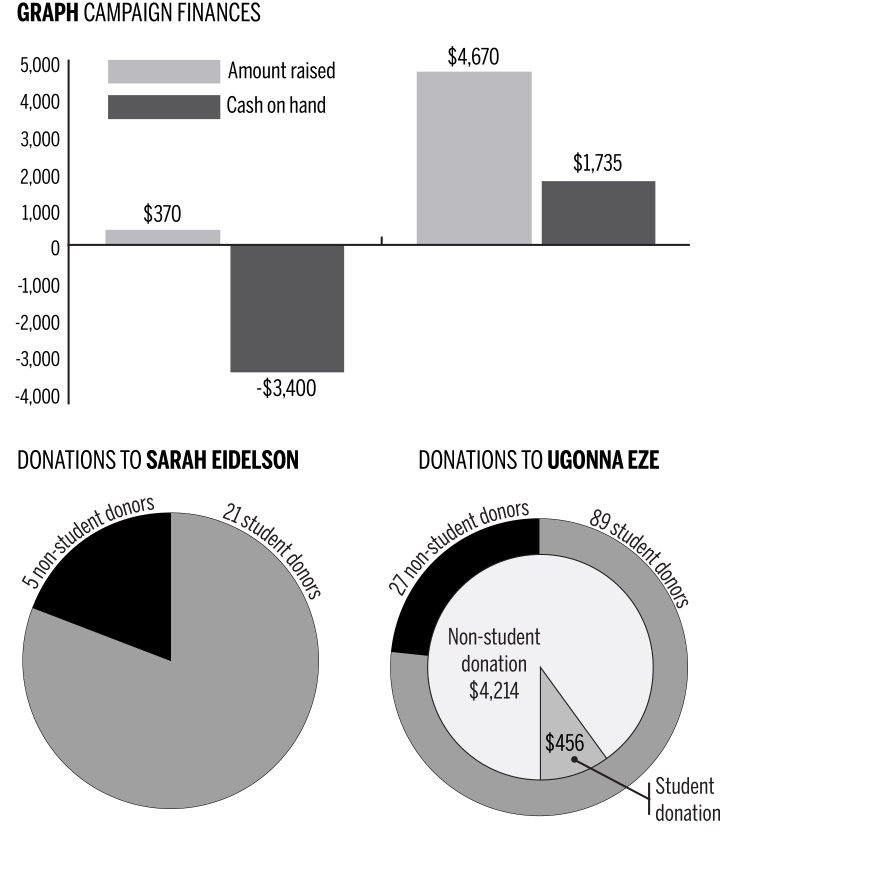
With two weeks until the November election for Ward 1 alder, the most recent campaign finance filings reveal that Republican Ugonna Eze ’16 has eclipsed Democrat Sarah Eidelson ’12 in fundraising by a 12-to-one margin.
Eze has raised $4,670 since June 1, roughly $3,500 of which was received after July 1. Eidelson, meanwhile, raised $370 before her primary victory over Fish Stark ’17 last month. Eidelson’s campaign has not received any further donations since then. In fact, her campaign has taken on an extra $1,800 in debt, leaving it with a total of $3,400 in unpaid expenses.
Eze’s campaign, which focuses on its connection with students on campus, received donations from 89 students, averaging just over $5 each. Only 21 students have donated to Eidelson’s campaign.
Despite the number of student donations Eze has received, the bulk of his campaign’s funding has come from 27 non-students, who have contributed an average of $175 each for a total of $4,200 — nearly 10 times Eze’s total from student donations.
Of those non-students, three donated $250, the maximum individual contribution to a campaign allowed under state law, and eight others gave $242. Not a single non-student who donated to Eze’s campaign lives in New Haven, but Eze received $250 from the New Haven Republican Town Committee.
Eze’s campaign counts 116 donors, but only 23 of those are included in the campaign’s July and October finance filings. State law mandates the disclosure of the names of donors who have made contributions in excess of $50. Only 23 of Eze’s donors, one of which is a student, have donated more than $50.
Eze said his number of donors reflects his broad base of support on campus. He added that the non-student donors are largely the friends and relatives of his campaign volunteers.
“We have an incredible amount of support within the ward, and a lot of people who are either relatives of people who are working the campaign or relatives of men who are very proud of what we’re doing donated to the campaign,” he said. “A lot of people are really proud and really excited.”
Eze has already raised more money than the average New Haven aldermanic candidate. Democracy Fund Administrator Alyson Heimer said the typical candidate raises between $2,500 and $3,500.
In a statement shortly after last week’s filing, Eze said the number of student donors to his campaign proves he will be able to serve as a “voice for the community.” He added that he will donate all unused campaign funds to a charity determined by a poll, after the race.
At the time of the most recent filing, Eze’s campaign had spent just under $3,000, leaving it with a war chest of at least $1,500 for the coming weeks. The bulk of the campaign’s expenditures have gone to printing and food costs.
Eidelson’s campaign finances stand in stark contrast to Eze’s. Eidelson said her campaign has not made fundraising a priority. Instead, Eidelson said, she and her volunteers have worked to engage in face-to-face campaigning to make the case for a third term.
“We have really had our main focus on doing the work of talking to as many students as we possibly can about the issues, and fundraising has not been a priority,” Eidelson said. She added that her campaign — which has not held any fundraisers — has a plan to repay its debts, but she declined to elaborate on its specifics.
Eidelson said the need to campaign for September’s primary left a condensed timeline for the aldermanic race. This forced her campaign to focus on talking to students instead of fundraising, she said.
The largest two segments of Eidelson’s campaign spending has gone towards printing and food, a commonality with Eze’s finances. Eidelson said this reflects her campaign’s push to “get our message out.”
Eze said he does not expect his financial advantage to be a vital factor in the November election.
“At the end of the day — and we saw this with the primary — what decides who wins the seat is the personal connections you have with voters,” he said. “What I’m going to do over the next few weeks is going door-to-door, getting the message out, talking with students.”
Eidelson agreed, stating that the “quality of the conversations we’re having with voters” will likely prove the deciding factor in November.







